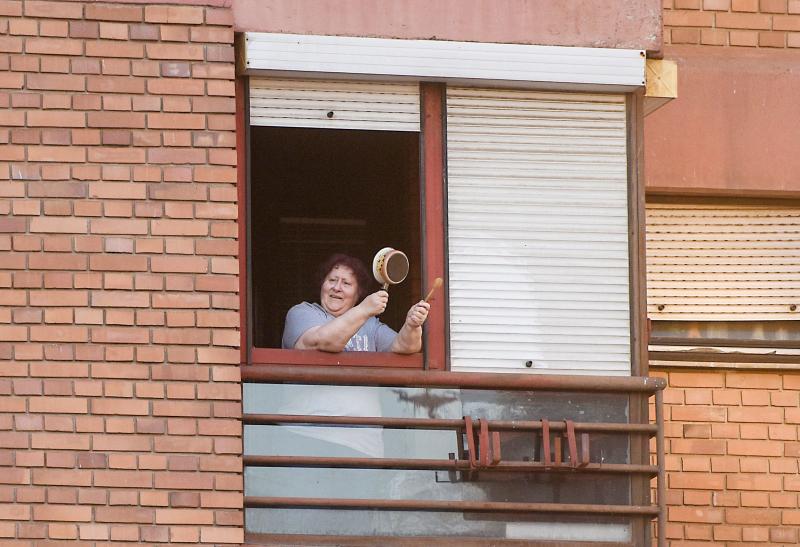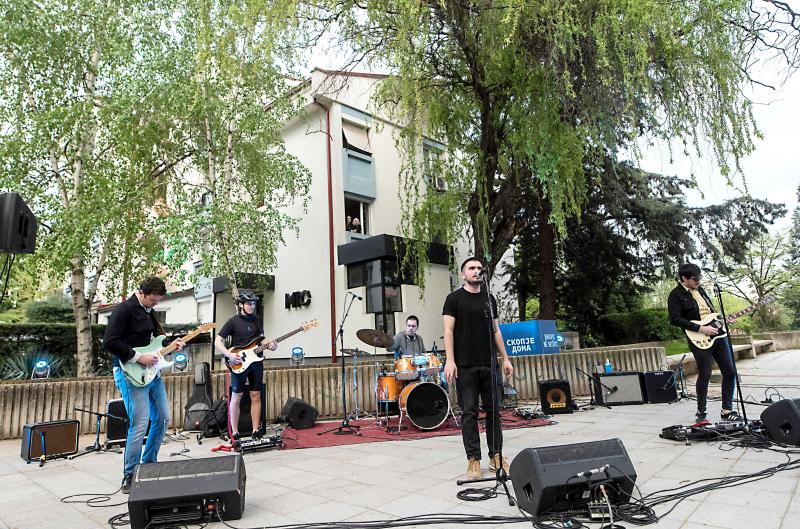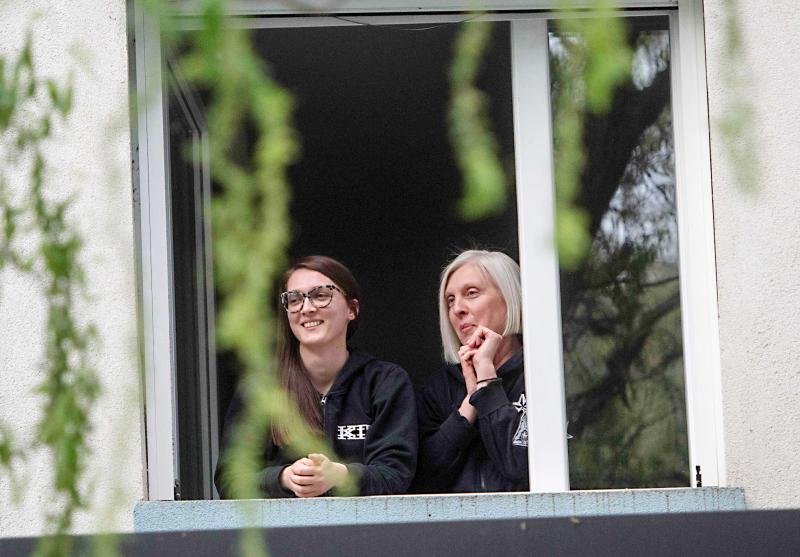Before kicking off a recent rock show in Skopje, the leader of the band Funk Shui did something he had never done before: apologize for the noise the group was about to make.
That’s because the musicians were jamming in an urban courtyard surrounded by apartment blocks, as part of a city initiative to entertain citizens — and help struggling artists — hemmed in by coronavirus curfews.
When concert halls, bars and clubs shuttered after North Macedonia went into lockdown in early March, performers were suddenly starting at blank calendars and empty wallets, while fans were robbed of their entertainment fix.

Photo: AFP
But the country’s artists and cultural institutions have been quick to adapt.
With backing from city hall, they have launched the “Culture in the time of Corona” program to save Skopje’s entertainment scene.
During the nightly curfews and over several weekend-long lockdowns, some 200 artists have put on more than 40 open air shows on rooftops, parks and playgrounds around the capital, with something for everyone in genres ranging from pop, rock and jazz to alternative and electronic music.

Photo: AFP
The shows have reached some 50,000 people in their homes and also garnered more than 500,000 views online, said Nikola Naumoski from the mayor’s officer. And in addition to easing the boredom of the apartment-bound, unemployed artists are getting 235 euros (US$255) — the country’s minimum wage — to help them survive the dry spell, he said.
The small Balkan country, where some 90 people have died from COVID-19, has issued some of the tightest restrictions in the region to curb the virus spread, including one holiday weekend curfew that topped 80 hours of confinement.
On a recent Saturday when families were hunkered down around the clock, members of the alt-rock band Funk Shui hung up their face masks before letting loose for their outdoor show.

Photo: AFP
As their funky guitar riffs echoed around the neighborhood, fans turned out on their balconies and windows to watch and dance along.
“It is a little bit strange, to have bands perform in a place like this, and I understand that there can be both complaints and joy. However, I hope that we brought some joy to the people in this neighborhood,” the group’s singer and guitar player Luka Gorgievski, 26, said.
Other Macedonian artists have also found creative ways to connect. One high school group organized a three-day online festival of movies, exhibitions, interviews with artists and music performances.
And Jovan Petreski, who performs under the name DJ Babura Junior, has been giving live electronic music concerts from his home since the start of the confinement.
After confirming his neighbors didn’t mind the noise, the popular 27-year-old DJ installed his speakers and other equipment on the balcony of his apartment, replete with a colorful strobe light.
At one recent session scores of apartments across the neighborhood added to the strobe affect by flickering their lights on and off to his beats.
“My parties were accepted way beyond my expectations,” the DJ said.
“It was not easy at the beginning when I thought that as an artist I won’t be able to work as usual,” he explained.
“That’s how I got the idea to start parties from my studio and entertain people the same way I did before the crisis.”

Taiwan has next to no political engagement in Myanmar, either with the ruling military junta nor the dozens of armed groups who’ve in the last five years taken over around two-thirds of the nation’s territory in a sprawling, patchwork civil war. But early last month, the leader of one relatively minor Burmese revolutionary faction, General Nerdah Bomya, who is also an alleged war criminal, made a low key visit to Taipei, where he met with a member of President William Lai’s (賴清德) staff, a retired Taiwanese military official and several academics. “I feel like Taiwan is a good example of

March 2 to March 8 Gunfire rang out along the shore of the frontline island of Lieyu (烈嶼) on a foggy afternoon on March 7, 1987. By the time it was over, about 20 unarmed Vietnamese refugees — men, women, elderly and children — were dead. They were hastily buried, followed by decades of silence. Months later, opposition politicians and journalists tried to uncover what had happened, but conflicting accounts only deepened the confusion. One version suggested that government troops had mistakenly killed their own operatives attempting to return home from Vietnam. The military maintained that the

Before the last section of the round-the-island railway was electrified, one old blue train still chugged back and forth between Pingtung County’s Fangliao (枋寮) and Taitung (台東) stations once a day. It was so slow, was so hot (it had no air conditioning) and covered such a short distance, that the low fare still failed to attract many riders. This relic of the past was finally retired when the South Link Line was fully electrified on Dec. 23, 2020. A wave of nostalgia surrounded the termination of the Ordinary Train service, as these train carriages had been in use for decades

Lori Sepich smoked for years and sometimes skipped taking her blood pressure medicine. But she never thought she’d have a heart attack. The possibility “just wasn’t registering with me,” said the 64-year-old from Memphis, Tennessee, who suffered two of them 13 years apart. She’s far from alone. More than 60 million women in the US live with cardiovascular disease, which includes heart disease as well as stroke, heart failure and atrial fibrillation. And despite the myth that heart attacks mostly strike men, women are vulnerable too. Overall in the US, 1 in 5 women dies of cardiovascular disease each year, 37,000 of them